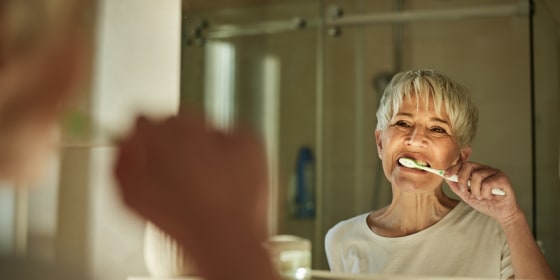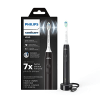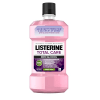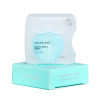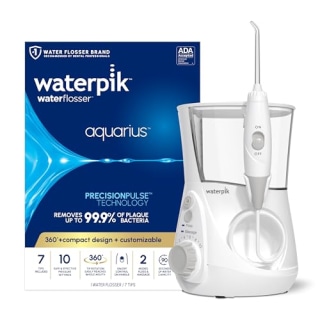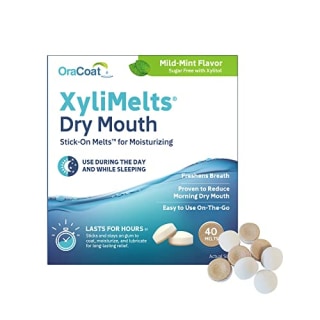Hot flashes, mood swings, dry skin — you’ve probably heard about those. But menopause can also take a toll on your oral health — a lesser-known symptom that deserves a lot more attention.
Let’s start with the basics: Menopause is officially diagnosed when a person hasn’t had a menstrual cycle for 12 months. Leading up to that is perimenopause, a transitional period when reproductive hormones, particularly estrogen, begin to drop. That hormonal shift is responsible for many of the symptoms associated with menopause, including the ones that can mess with your mouth.
To understand what’s going on, I spoke to two experts (a gynecologist and a dentist) who broke down how menopause affects your teeth and gums, plus what you can do to stay ahead of it.
How does menopause affect your oral health?
Estrogen plays a major role in maintaining the health of your oral tissues. When levels drop, your mouth can feel the impact.
“During menopause, the decline in estrogen can lead to significant changes in the oral cavity, including dry mouth (xerostomia), burning tongue (glossodynia), increased gum sensitivity and changes in taste,” says Dr. Somi Javaid, a board-certified OB/GYN and founder of HerMD.
Hormonal shifts can also raise your risk of gum inflammation, gingivitis and periodontal disease.
Saliva production is another issue. “Saliva is essential for neutralizing acids, washing away bacteria and preventing tooth decay,” says Dr. Pia Lieb, a cosmetic dentist at Cosmetic Dentistry Center NYC. “Without enough saliva, you’re more vulnerable to cavities, infections, and even trouble speaking or swallowing.”
Menopause can also increase your risk of osteoporosis, which can affect the jawbone and potentially lead to tooth loss or complications with dental implants.
How to protect your teeth during menopause
Now for the good news: You don’t have to kiss the health of your teeth goodbye just because you’re in perimenopause or menopause. According to our experts, you can do several things to prevent declining oral health during this time of life. Below, some of the most effective tactics:
- Practice good oral hygiene: “Brush twice daily with fluoride toothpaste, floss daily, and use alcohol-free mouthwash,” says Lieb. Regular flossing is also crucial, adds Javaid.
- Stay hydrated: If dry mouth is an issue, increase your water intake, says Lieb. “You can also use saliva substitutes to keep your mouth hydrated.”
- Go to the dentist regularly: “Regular checkups and cleanings become even more critical during and after menopause,” says Lieb. Plus, routine deep cleanings will prevent plaque buildup. Early detection and intervention can mitigate the progression of oral health complications associated with menopause,” says Javaid.
- Talk to your doctor: Make an appointment with your gynecologist to discuss overall treatments for menopause that may be suitable for you. “Hormone therapy (HT) may be beneficial for many women, particularly when oral symptoms are part of a broader systemic hormonal deficiency,” says Javaid. “A comprehensive evaluation is essential to tailor treatment to the patient’s needs.”
Menopause oral health products to shop
Experts told us that maintaining oral hygiene is crucial during menopause. To help you do just that, we rounded up popular products that seamlessly integrate into your teeth cleaning routine. All of the products below have either been recommended by experts in previous reporting or have high ratings.
Best toothbrush: Philips Sonicare 4100 Electric Toothbrush
One of our favorite electric toothbrushes, this model from Philips Sonicare has an ergonomic handle, up to two weeks’ worth of battery life on a full charge and a two-minute timer to help you brush for the recommended time. It also has a pressure sensor that alerts you if you are brushing too hard.
Best floss: Cocofloss Floss
This floss is an NBC Select Wellness Award winner, thanks in part to the fact that it’s made from recycled polyester, vegan wax and coconut oil and allows you to reach the back of your mouth while also soothing gums, according to the brand. NBC Select commerce editor Jordan Bowman likes that it is on the thicker side because it easily grabs plaque or food scraps from in between his teeth.
Best water flosser: Waterpik Aquarius Water Flosser
Some people prefer to use a water flosser over regular floss. We’ve recommended this model previously because it is one of the most popular models on the market. You can adjust the pressure settings and select between two modes — floss and massage. It also comes with four tips: standard precision, orthodontic, pik pocket and plaque seeker.
Best mouthwash: Listerine Total Care Zero Alcohol Anticavity Mouthwash
This mouthwash is free of alcohol and can strengthen enamel, prevent cavities and freshen breath, according to the brand. The minty taste is not overwhelming and it contains fluoride to further protect teeth.
Best saliva substitute: Oracoat XyliMelts
Place one of these melts on your gum line and leave it be for 10 seconds as it dissolves. It will act as a saliva substitute to hydrate a dry mouth. You get 40 sugar-free melts in a pack and they have a mild mint flavor. One melt will relieve dry mouth symptoms for up to a few hours.
Meet our experts
At NBC Select, we work with experts with specialized knowledge and authority based on relevant training and/or experience. We also ensure all expert advice and recommendations are made independently and without undisclosed financial conflicts of interest.
- Dr. Somi Javaid is a board-certified OB/GYN surgeon and founder of HerMD
- Dr. Pia Lieb is a cosmetic dentist at Cosmetic Dentistry Center NYC.
Why trust NBC Select?
Bethany Heitman is a contributor at NBC Select and a journalist who regularly covers topics like beauty, home and lifestyle. For this story, she interviewed two experts on menopause and oral health.
Catch up on NBC Select’s in-depth coverage of tech and tools, wellness and more, and follow us on Facebook, Instagram, Twitter and TikTok to stay up to date.
